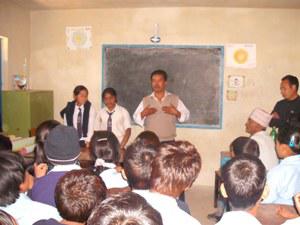Parshuram Sharma Niraula
The project aims at sensitizing the school and community members about the biodiversity richness in the locality and to conserve and take care for their sustenance, wise use and support, with the main focus on curriculum development, lesson plan development and teaching methodology. This approach is hoped to have a long-term impact on the environment and its sustainability.

Teachers sharing their views.
There are about six government/community schools in the project area, where the children from poor families study. The only big private in the locality is Shuvatara International School, where the proponent of this project, Parshuram Sharma Niraula works as one of the Vice Principals. He is also the Founder Chairman/Executive Director of the Centre for Environment Education Nepal (CEEN), a national NGO committed to the promotion and dissemination of EE/ESD in Nepal. The owner of Shuvatara School, Mr. Shyam SL Kakshapati, is the Chairman who also owns a chain of restaurants in Kathmandu valley and outside, popularly known as ‘Nanglos’. His wife, Mrs. Rani G Kakshapati, a keen educationist and social worker, is the Founder Director and Principal of this school. Both are very much philanthropic and do a lot of social service, and are very supportive of community development projects/programs.

Children during presentation.
A teacher each from six schools, representatives from local youth clubs, Forest User Group (FUG) leaders and forest officials will be invited to a series of workshop where the richness of the biodiversity and the issues surrounding the area will be discussed. The teachers will be trained thoroughly to correlate the subject matter in the textbooks with that of the surrounding environment, encouraging the children to observe their locality, recognizing values and analysing and applying in their daily lives. Activities/questionnaires will be designed to undertake action-research projects encouraging the children to come to an action through the principles of Reuse, Recycle and Reduction of consumption. The information and knowledge gathered through this approach will be disseminated to the public and the media through an exhibition for wider dissemination. Upon recommendation from the community, a modest urinal will be constructed, and several signposts will be made to remind/reinforce the citizens about conservation and sustainable communities.
We had a series of workshops in the past aiming to sensitize the public on environment conservation. We went around the stream to study its status and also involved the community schools and members in its clean-up as a part of World Environment Day programs. We have thoroughly discussed to investigate five basic areas during these workshops and meetings: Stream (water condition), Farming patterns, Forestry and Wildlife, Socio-cultural-economic condition, and Impact of modernization /development works, which will be widely shared through exhibition/street theatre, etc.